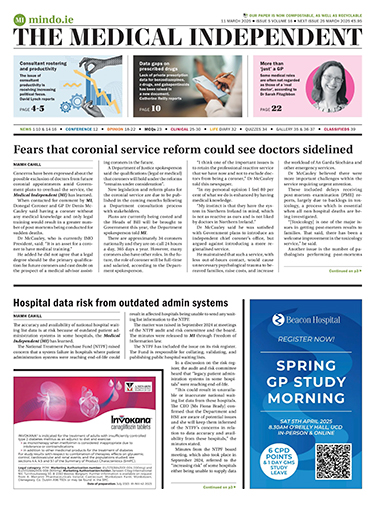The coming year looks set to be an important period in the growth of artificial intelligence use in Irish healthcare, writes David Lynch
The use of artificial intelligence (AI) in healthcare is “coming to the fore very rapidly”, the Minister for Health Stephen Donnelly told the Dáil last month.
The Minister highlighted the “potentially radical benefits” in diagnostics, advanced care and robotics for procedures, “and as we move forward with genetics, genomics, and genome sequencing.” However, the Minister noted that to “capture” the benefits of AI within the Irish health service, “a state of the art” e-health and digital infrastructure needed to be put in place.
“The reality is Ireland is not just a laggard, but a significant laggard in the EU and the developed world in this regard,” he admitted.
Despite this, the deployment of AI in Irish hospitals is increasing and 2024 is set to witness some significant policy development in the area.
Mater
In December the Mater Misericordiae University Hospital, Dublin, announced that it had become the first hospital in Ireland to use AI across its radiology department in order to accelerate emergency care. The hospital said this had resulted in rapid notification of suspected pathologies, enhanced patient care, and was freeing up time for staff in the department.
Since the introduction of the AI-assisted software last year, more than 15,600 patient scans have been analysed in the Mater. According to the hospital, over 700 pathologies were correctly flagged by AI within two-to-three minutes of the scan being completed, with 500 intracranial haemorrhages and 200 pulmonary emboli being identified.
The screening platform, made by Aidoc, operates on an ‘always-on’ basis. This means it is constantly running in the background in order to analyse medical imaging data, flag urgent findings, and highlight cases that should be prioritised and brought to the immediate attention of consultants.
The coming months will see a further expansion in the use of AI at the hospital, Consultant Radiologist Dr Peter MacMahon told the Medical Independent (MI).
“The Mater Hospital is currently in the advanced stages of implementing a new AI project, primarily focused on enhancing our emergency department’s capabilities, with potential for expansion to other areas,” Dr MacMahon said. “We are introducing ‘Boneview’, a sophisticated AI tool developed by the French company Gleamer.”
Boneview is designed to accurately and automatically identify fractures, effusions, dislocations, and bone lesions, and provide immediate results at the point-of-care.
“Subject to the pilot’s success, we envisage its routine application in clinical practice.”
Dr MacMahon said Boneview will enhance diagnostic precision and expedite patient processing times in the emergency department. It is hoped that it will ultimately reduce the duration of visit times and minimise patient recalls.
“Once this new tool is safely deployed into clinical use, we aim to integrate a separate AI tool, no earlier than April, to automatically analyse all chest x-rays in the hospital, including the emergency department,” added Dr MacMahon. “This will hopefully enhance the detection of urgent findings like pneumothorax, pleural effusion, and consolidation (pneumonia), as well as early cancer indicators such as nodules, and mediastinal masses. As you can imagine this has the potential to have a very significant impact on patient care.”
Academic
The impact of AI is also growing in the area of health research. Last October, the University of Galway announced that it had secured funding from the Health Research Board (HRB) to advance blood pressure treatment using AI.
The project is led by Dr Conor Judge, a senior lecturer of applied clinical data analytics with University of Galway’s College of Medicine, Nursing and Health Sciences, and Consultant Nephrologist at Saolta University Health Care Group.
The research project will run for four years and aims to address the “significant care-gap in hypertension management”. Currently, people with the condition are required to visit their doctor frequently, “thus posing a challenge to both the person with hypertension and the healthcare providers.” The project will explore “the potential of artificial intelligence in enhancing treatment decisions”.
“The most important result from this project will be our use of ‘explainability’ tools to illuminate the inner workings of medical AI systems,” Dr Judge told MI.
“By doing so, we aim to demystify the often-perceived ‘black box’ nature of artificial intelligence in healthcare,” he added.
Dr Judge said the project’s vision “is to provide doctors with a clear and transparent understanding of how AI-based clinical decision-making tools arrive at their conclusions”.
“This transparency is key to building trust and confidence among medical practitioners and will enhance the accuracy and efficiency of clinical decisions.”
The most important result from this project will be our use of ‘explainability’ tools to illuminate the inner workings of medical AI systems
Strategy?
While speaking in the Dáil last month, Minister Donnelly said the Government was “doing a lot of work on a new e-health and digital strategy”. He added that he intended to publish that document in 2024 and that it will be a “six- or seven-year strategy”.
Digital for Care – Digital Health Strategic Framework 2024-2030 is in the “final stages of drafting”, a Department of Health spokesperson confirmed to MI. The spokesperson added it is anticipated that it will be published before the Health Information Bill. The framework will reference the Bill and the underlying purpose and principles of the new legislation.
“AI will be covered in the innovation section, including the need for clinical validation and risk assessment given current and future regulation applicable for health sector,” said the spokesperson.
WHO guidance
The World Health Organisation (WHO) has also recently released new guidance on the ethics and governance of generative AI in health. The guidance outlines over 40 recommendations for consideration by governments, technology companies, and healthcare providers to ensure the appropriate use of AI to promote and protect the health of populations.
“Generative AI technologies have the potential to improve healthcare, but only if those who develop, regulate, and use these technologies identify and fully account for the associated risks,” said Dr Jeremy Farrar, WHO Chief Scientist.
The Department’s spokesperson told MI it had “noted” the WHO publication.
“The WHO guidance also suggests that guidelines should be developed through co-operation between countries and that is likely the route Ireland will follow for health in Ireland,” said the spokesperson.
“The Department of Health will also develop and progress the use of AI in health in line with our requirements under current and future regulations in this area.”
New council
Last month the Department of Enterprise, Trade and Employment (DETE) announced the formation of the new AI advisory council. It was established by Minister of State with responsibility for Digital Dara Calleary “to provide independent expert advice to Government on artificial intelligence policy”.
The Council met for the first time on 17 January.
A DETE spokesperson told this newspaper that the Council is currently developing its workplan. Asked whether the new body would produce any guidelines for the use of AI in healthcare, the spokesperson said that it was not expected that the Council will develop specific guidelines on any area.
“Its role will be to provide concise, high-level strategic advice,” the spokesperson told MI.
According to the published biographies, none of the current members of the Council have a background in medicine or healthcare. Asked whether this may change in the future, the DETE spokesperson said the Minister may decide to appoint additional Council members, but “no further appointments are envisaged at this time”.
“The AI advisory council is a mechanism for expert advice and not a consultative or a representative forum.”













Leave a Reply
You must be logged in to post a comment.